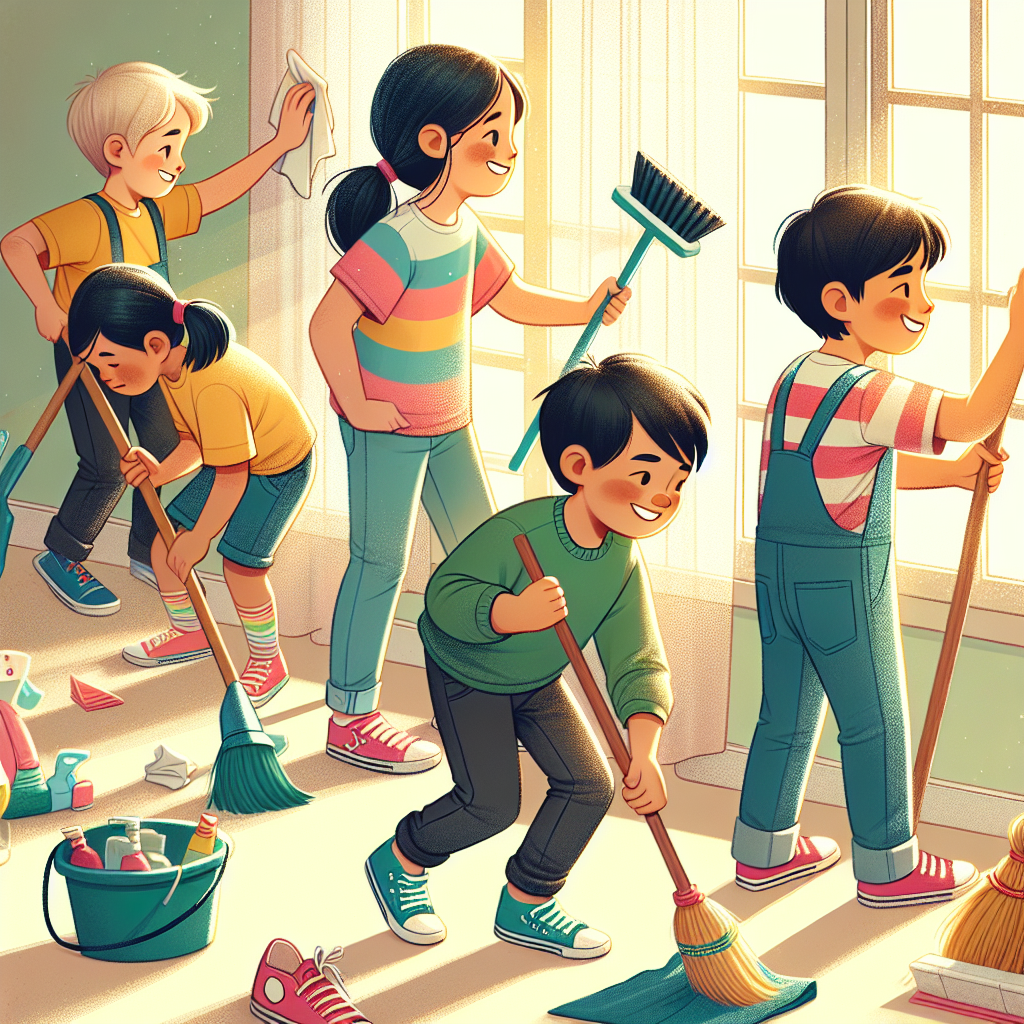
The Ultimate Guide to Age-Appropriate Chores for Children: Building Responsibility from an Early Age
As parents, we often juggle a busy schedule while managing the home. An essential part of raising well-rounded children is teaching them the value of responsibility and work ethic. One of the best ways to do this is by introducing chores to your children in a fun and structured way. Age-appropriate chores help them develop life skills, while also lightening the load around the house.
But what chores are suitable for your child’s age? In this guide, we’ll break down children’s chores by age, providing a chore list for kids that is not only manageable but also helps them gain independence. Whether you have a nursery child or a teen, there are plenty of tasks they can do to contribute to the household and learn responsibility. House Cleaning Sunderland is here to help you.
Why Chores Are Important for Kids
Before diving into specific chores, it’s important to understand why assigning chores to children is so beneficial. Chores for kids teach life skills such as time management, organization, and the importance of contributing to a family unit. Completing chores also boosts their confidence and instills a sense of pride in their work.
Age-Appropriate Chores: A Breakdown
The key to assigning chores is to ensure they are age-appropriate. Giving children tasks that match their abilities encourages independence without causing frustration. Here’s a breakdown of suitable chores by age, offering ideas for children at different stages.
Chores for 4-Year-Olds: Starting Small
At the age of 4, children are just beginning to develop fine motor skills and a sense of responsibility. Keep their tasks simple, focusing on basic household chores that allow them to be involved in the process.
- Making their bed: Help them straighten the sheets and arrange their pillows.
- Tidying up toys: Encourage them to put away toys and books after playing.
- Wiping down surfaces: Use a damp cloth to clean simple surfaces like tables or countertops.
- Feeding pets: If you have pets, children can be responsible for filling their water or food bowls.
Chores for 5-Year-Olds: Building on Responsibility
At 5 years old, children are capable of handling more structured tasks. They will enjoy having a bit more control over their chores.
- Setting the table: Teach them how to set the table for meals with plates, napkins, and utensils.
- Watering plants: A great way for them to help with indoor or outdoor plants.
- Putting dirty clothes in the laundry: Help them recognize where to put dirty clothes and how to separate them.
- Organizing shoes and jackets: Teach them to put away their shoes and hang up coats.
Chores for 6-Year-Olds: Encouraging Independence
By 6, children are ready for slightly more complex tasks that can help them feel more independent and capable.
- Sweeping small messes: Give them a small broom and dustpan to clean up crumbs or dirt.
- Loading the dishwasher: While they might not be able to wash dishes, they can help load and unload the dishwasher.
- Cleaning windows: With a non-toxic cleaner, children can help wipe down windows or mirrors.
- Helping with grocery organization: After a grocery trip, they can help sort and put away items in the pantry.
Chores for 7-Year-Olds: Growing Responsibility
At this age, children are starting to develop a strong sense of responsibility. They can manage tasks with minimal supervision.
- Making simple meals or snacks: Depending on their interest and safety, they can make simple snacks like sandwiches or prepare fruit for a salad.
- Folding clothes: They can fold towels, shirts, and socks, which is a great way to practice organizing.
- Emptying trash cans: Have them empty the smaller wastebaskets around the house.
- Sweeping the floor: Help them sweep the floors after meals or projects.
Chores for 8-Year-Olds: Developing Routine
By the age of 8, children can handle more responsibility and can be trusted with regular, routine tasks.
- Vacuuming: Depending on the size of the vacuum, children can vacuum their rooms or common areas.
- Mopping floors: A smaller mop or one with a sponge is great for this age to help clean floors.
- Making their own breakfast: Simple tasks like pouring cereal or making toast can be mastered.
- Cleaning the bathroom sink: A great way for them to take responsibility for their space.
Chores for 9-Year-Olds: Becoming More Involved
At 9, children can take on even bigger tasks that require more attention to detail and responsibility.
- Laundry tasks: They can start sorting laundry, folding clothes, and even helping to load the washing machine.
- Cleaning the bathroom: They can clean the sink, wipe down mirrors, and scrub the tub with a bit of guidance.
- Dishwashing: If they can’t do the dishes alone, they can help with rinsing and drying.
- Washing the car: They can help with simple tasks like hosing down the car or cleaning windows.
Chores for 10-Year-Olds: Handling Complex Tasks
Children at this age are capable of tackling tasks that adults might not even think twice about. They are developing strong organizational skills and can take ownership of chores.
- Deep cleaning their room: Encourage them to clean under the bed, organize drawers, and tidy up their study area.
- Cooking simple meals: Help them learn basic cooking skills, like making scrambled eggs or preparing a pasta dish.
- Taking out the trash: They can be responsible for gathering and taking out the trash in the house.
- Pet care: If you have pets, they can help with feeding, walking, or grooming.
Chores for 11-13-Year-Olds: Independence at Its Best
By this age, your child can take on a variety of household chores independently and may even enjoy helping with big family tasks. They are ready to pitch in for larger projects and manage some family responsibilities.
- Preparing full meals: Children this age can learn to prepare complete meals, from main dishes to sides.
- Washing dishes: They can take full responsibility for washing the dishes, loading, and unloading the dishwasher.
- Cleaning the garage or basement: They can help organize and clean larger spaces like the garage or basement.
- Managing their own schedule: Give them the responsibility to keep their chores on track with a children’s chore list or a chore chart.
Creating a Children’s Chore Chart
One great way to encourage kids to complete their chores is by using a children’s chore chart or chore list for kids. This visual reminder keeps them motivated and teaches them about responsibility. You can tailor the chart by adding tasks that are appropriate for their age and abilities.
Pro Tip: Make the chart fun by using stickers or stars for completed chores, and offer small rewards to celebrate their hard work.
